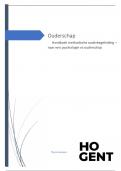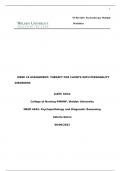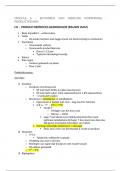500881-M-6
2024/2025
Summary of course material
Saskia Kriege
,Neuropsychology of Ageing
Lecture 1 – 25/10 WEEK 1
Cognitive decline over age → major marker of dementia so often first concern
How can we differentiate between normal and abnormal?
Basic interview techniques
Explore living environment/world
+- 30min interview
Introduction into Successful Aging WEEK 1 PART 1
Meaning changed over historical times and will continue to vary along with changes
in societal, cultural and biological norms
Introduction to Successful Aging?
= subjective experience, the person itself.
Also clinically.
Changed over time, varies along with societal and cultural norms.
Cannot just ask person → depends who you’re asking whether successful or not.
Psychosocial models of successful aging
- Life satisfaction
- Social functioning
- Psychological resources
Biomedical model of successful aging
Usual ageing vs successful ageing
- Avoiding disease and disability
- Engagement with life
- High cognitive and physical functioning
= successful aging
Layperson’s perspective on successful aging
Scientific theorizing needs to reflect and be linked to reality to have societal impact
and relevance
Combination of both models
Depending on individual and their context
,Combining models of successful aging
Quantitative model (WHO criteria)
Need optimal overall functioning and well-being to successfully age
➔ Focus on measurable factors
After asking older people:
Layperson model
In case you can adapt → if it doesn’t hinder you, you can successfully age.
➔ More subjective. Based on personal perceptions and life satisfaction.
With quantitative model → 10% classified as successfully aged
In Layperson model → almost all rated themselves as successfully aged
How to define successful cognitive (memory) aging
- Individual differences within older adults
- Comparing people to performance of younger adults
- Successful aging as absence of longitudinal decline
Ideally you need longitudinal data.
Else: take all older people, take top tertial of a cohort → people that have still good
memory
Inter-individual differences in cognition/memory
, Still some people that are old and highly performing
What accounts for individual differences in the aging process?
Protective and risk factors.
Brain reserve/cognitive reserve → terms in saying successfully aged
Process-oriented models of successful aging
Maximizing of gains while minimizing losses; improvement/maintenance and
reorientation of goals/goal structures when coping with major life change and loss.
Goals and goal structures
- Goals organize human life development
- Lifespan changes/losses lead to emergence, maintenance, transformation,
disengagement in specific goals
- Aging involves reductions in scope of goals
Space/opportunities is limited due to physical/cognitive decline
Do you need to accept things will change → conscious process?
Almost no older people say they will move to nursing home → most people deny
Most people as much as possible ignorant.
Shifting balance between gains and losses
Losses early in life → pruning, language recognition. Limited. Increasing with age
People need to decide where to allocate their resources.
Young = growth. Learn new things. Invest time in being here










